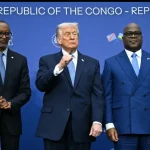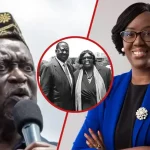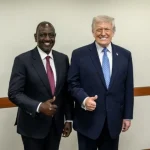In the digital age, revolution doesn’t always look like protests in the streets. Sometimes, it looks like a 26-year-old presidential daughter dancing on TikTok while wearing a Rolex. Brenda Biya, daughter of Cameroon’s 91-year-old President Paul Biya, has become an unexpected leader in Africa’s new wave of digital resistance, using social media platforms to challenge authoritarian norms and spark crucial conversations across the continent.
What makes Brenda’s approach particularly revolutionary isn’t just what she’s saying, but how she’s saying it. While traditional activists face censorship, arrest, and violence, Brenda has leveraged her unique position to create a new playbook for digital dissent that’s being closely watched by young activists across Africa.
The Anatomy of a TikTok Rebellion
Brenda’s social media strategy represents a masterclass in modern digital activism:
-
Strategic Authenticity: Her content blends carefully curated luxury with seemingly spontaneous moments, creating an aura of authenticity that resonates with younger audiences. This isn’t the polished propaganda of state media; it’s the raw, unfiltered content that Gen Z craves.
-
Coded Communication: Every post serves multiple purposes. A simple video showing a luxury watch comments on wealth inequality. A casual mention of human rights during a makeup tutorial challenges government policies. This layered approach allows her to communicate dangerous ideas while maintaining plausible deniability.
-
Platform Intelligence: By choosing TikTok over traditional platforms, Brenda taps into Africa’s youngest demographic. With over 60% of Africa’s population under 25, and TikTok’s explosive growth on the continent, she’s speaking directly to the demographic that will shape the region’s future.
The New Rules of Digital Resistance
Brenda’s approach has established several new principles for digital activism in restrictive environments:
-
The Privilege Shield: Her status as a presidential daughter provides protection that ordinary activists lack, allowing her to push boundaries that would land others in jail.
-
Visual Storytelling: She understands that in the attention economy, powerful visuals (like her apparent LGBTQ+ support) can communicate more effectively than lengthy political manifestos.
-
Global Amplification: By posting in multiple languages and engaging with international audiences, she ensures that any attempt to silence her would create immediate global backlash.
The Ripple Effect Across Africa
Brenda’s digital rebellion is inspiring similar movements across the continent:
-
In Uganda, young activists are using meme culture to critique long-standing leadership
-
Nigerian youth have perfected the art of “Twitter storms” to demand political accountability
-
Sudanese activists used social media to coordinate and document their revolution
What makes Brenda’s case unique is her position within the system she’s critiquing. This insider status gives her both unprecedented access and unusual protection, creating a new model for how privilege can be weaponized for progressive change.
The Future of African Digital Activism
Brenda Biya’s TikTok presence represents more than just personal expression—it signals a fundamental shift in how political discourse happens in Africa. As more young Africans come online, and as smartphone penetration deepens across the continent, we’re witnessing the emergence of a new political reality where:
-
Social media platforms become the primary spaces for political organizing
-
Visual content outperforms traditional political rhetoric
-
Young women increasingly lead digital resistance movements
-
The line between personal expression and political protest blurs beyond recognition
The 91-year-old president now finds himself in a battle he never prepared for—not against rival politicians or armed rebels, but against his own daughter’s TikTok account. And in this new digital arena, the old rules of power no longer apply.
As Africa’s youth continue to find innovative ways to use digital platforms for political expression, Brenda Biya’s story serves as both inspiration and warning: the future of African politics will be shaped not in presidential palaces, but on the smartphone screens of the continent’s rising generation.










